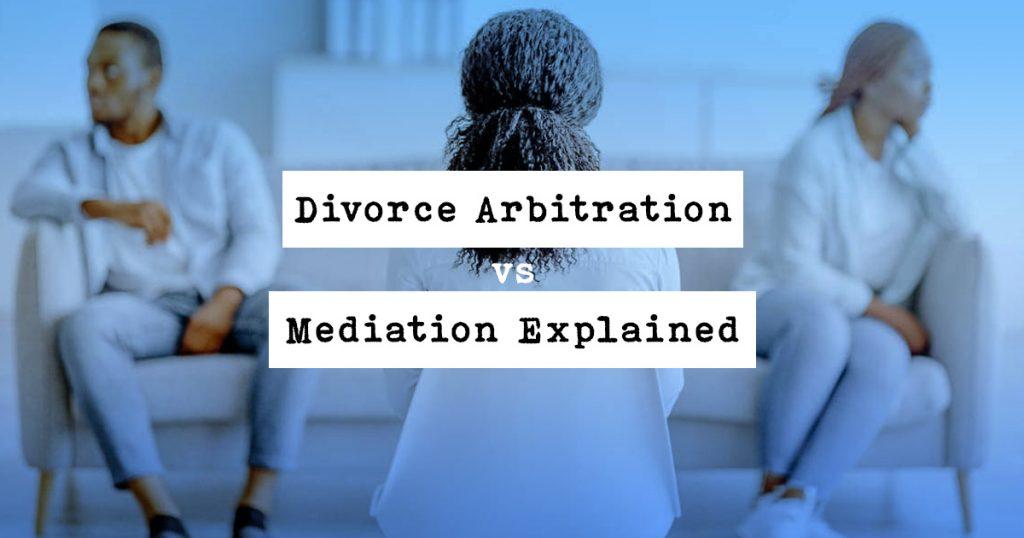For individuals experiencing the challenges of divorce, navigating through uncertainty is common. Here, we offer guidance to aid clients in making well-informed choices regarding the most suitable approach to the divorce process for all parties concerned. We’ll explain divorce arbitration vs. mediation situations and outcomes below.
What is Divorce Arbitration?
Arbitration serves as a method, among others, for resolving conflicts between divorcing parties. It becomes particularly relevant when couples encounter a deadlock in negotiations and seek to settle matters without resorting to litigation. Unlike conventional courtroom proceedings, divorce arbitration entails a private session before an arbitrator, referred to as an arbitration hearing. This arrangement offers flexibility in scheduling, accommodating the convenience of all involved parties, unlike court trials dictated by the availability of a judge.
During divorce arbitration, the couple and their respective legal representatives collaboratively select an arbitrator, who is then tasked with addressing the specific issues hindering resolution. Additionally, divorcing parties may outline the procedural framework and timeframe within which the arbitrator is expected to deliver a decision. Following the hearing, the divorce arbitrator issues a binding decision, termed an award, regarding the contentious matters. Unlike court trials, the arbitrator’s award typically lacks avenues for appeal in most instances. Divorce arbitration can be integrated into adversarial proceedings, where it replaces an in-court trial, or incorporated within collaborative divorce or mediation when negotiation impasses occur.
Benefits of an Arbitrated Divorce
- Couples going through a divorce choose the arbitrator who will make decisions about their problems.
- They can choose an arbitrator with special knowledge in areas like taxes or real estate.
- Couples decide which issues the arbitrator will handle.
- They choose when and where the hearing will happen.
- Divorcing couples prefer arbitrated divorce because it’s private and not as formal as a court trial. It saves time, money, and stress compared to going to court.
What is Divorce Mediation?
This kind of mediation lets spouses talk directly to each other with the help of a mediator. The mediator doesn’t make decisions like a judge or arbitrator. Instead, they guide the spouses to agree on a divorce plan that works for both. The mediator focuses on what each person wants and needs, not just their demands.
For example, one person might think they deserve the family van. But their spouse wants to start a business from home. After talking it through, they might realize that if their spouse earns money, they might need to pay less support. So, they agreed to give up the van. Here, one person wants to be self-employed, and the other will benefit from it.
The mediator usually meets with both spouses together at least once. Then, they might have separate meetings with each spouse. Sometimes, couples can’t agree on everything during mediation. In that case, they might switch to a regular divorce process or try arbitration for the things they can’t agree on.
Benefits of a Mediated Divorce?
- Divorce Mediation is a great way to save money, time, and avoid the stress that comes with regular, fighting-type divorces.
- It helps people talk openly and nicely to each other, which is important for keeping a good relationship after a divorce.
- In mediation, the focus is on solving problems and making decisions together. It’s all about what the people involved want and what they think is best for themselves and their kids.
Considerations When Choosing Between Divorce Mediation vs. Arbitration
- According to the law, a mediator can’t give legal advice. They’re there to help both sides talk and figure things out together.
- During mediation, a spouse’s lawyer is more like a helper than someone who argues for them. They’re there to give advice, not fight.
- A spouse’s lawyer might not need to come to every mediation meeting.
- It’s a good idea for each spouse to have a lawyer who knows about mediation. Not all divorce lawyers are good at this kind of peaceful problem-solving.
- In divorce mediation, the mediator helps the couple come to an agreement. But in divorce arbitration, an arbitrator makes the final decision, like a judge in court. This can be useful when couples can’t agree on something specific, like who pays for certain things.
Which is better: arbitration or mediation?
Choosing between mediation and arbitration depends on your unique circumstances. In the case of divorce, your decision hinges on factors like how swiftly you want matters resolved and your ability to collaborate with your spouse. If you’re uncertain about cooperating, arbitration might be preferable, as it assigns the final decision to an arbitrator. On the other hand, if both parties can collaborate effectively, mediation typically emerges as the favored option for reaching agreements amicably.
Decide Between Divorce Arbitration and Mediation for a Smoother Separation Process
For individuals navigating divorce, understanding the differences between mediation and arbitration is crucial. Whether you opt for arbitration or mediation depends on your unique circumstances. If you’re uncertain about cooperation, arbitration might be preferable, as it places the final decision in the hands of an arbitrator. Conversely, if collaboration is possible, mediation often leads to amicable agreements. Consider your situation carefully, seek guidance, and make the choice that best serves your needs and priorities.
